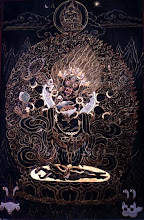
The most touching and meaningful selection from One came for me in the most unexpected text, a selection from a longer work on modern education. While the apparent focus is on children, author Steven Harrison is clearly addressing the adults, all adults, those with or without children. He begins with observations about the behavior of three-year olds, who seem to never tire of asking “why?”
We often mistake this behavior of the three-year-old for that of someone looking for answers. We have usually forgotten what this state of profound curiosity is really about. As adults, we inhabit a concrete world of relative certainty, and we assume that this is what the child is looking for.
This is why you shouldn't trust anyone over three.
Young children are simply curious. Learning something doesn't fulfill their interest. This thirst cannot be quenched by answers. They want to know more, regardless of what they have found out so far. Their question in life is their life.
We can't answer their question.
We can, however, join them in their question. That would require us to abandon all our answers. We might lose track of time. We might not get anything done today. There may be no point to the question at all. The whole thing may be totally pointless, like a game without a score, without a conclusion, without a . . . winner.
Maybe it's time to get some structured play going, with rules and some competition; after all, that is what these kids are going to face in life. Why do they want to spend so much time just playing?
Or, we could teach them that there is an answer to most questions and when there is no answer, then it is time to do something else besides ask these incessant questions. Over time, we can teach them to wonder less, to give up their questioning more easily, and to accept answers as conclusions, and then they will be well prepared to go to school. After school, they can live a productive life. And we can get back to what we were doing, which is no doubt pretty important.
And what if this questioning was cultivated, not quenched? What is the potential of a child whose curiosity knows no bounds? What would become of us as parents? What would become of our answers? What would become of the world?
We seem apprehensive of our children and their relentless drive to discover, their unfettered energy and clear eyes. Have we lost this quality so completely in our lives that we have forgotten its value? Will the world we have constructed withstand their gaze?
If we do not give our lives over to this drive for discovery in our children and in ourselves, if we restrict our children to the answers we have already formulated, it leaves us with one simple question.
Why?
The Happy Heart: Changing the Heart of Education
Steven Harrison 2002



























0 comments:
Post a Comment